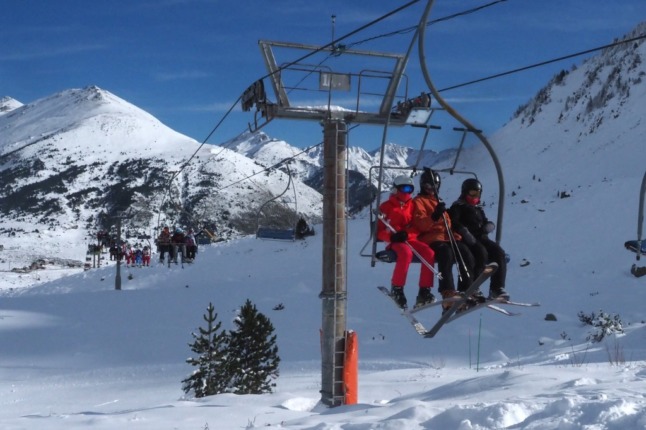The 2019/20 ski season, already disrupted by strikes, was abruptly curtailed in March 2020 when the entire country went into lockdown. And for ski industry workers things went from bad to worse the following year, with the 2020/21 season rendered a virtual write-off with the closure throughout the season of bars, restaurants and ski lifts.
But as France reopens it faces the same challenge as its Alpine neighbours of Switzerland, Austria and Italy – how to get the ski industry back on its feet without unleashing another wave of Covid cases.
The tourism minister Jean-Bpatiste Lemoyne, who has been working with the ski industry on a more detailed plan for the season, said: “We can see by talking with industry representatives that they expect a good season, even a very good season, since we have unfortunately been deprived of snow sports since March 2020.”
Here’s what we know so far about the measures in place for the 2021/22 season, with the obvious caveat that circumstances can change.
Travel
If you’re wanting to head to the Alps or the Pyrenees from outside France, you will need to know about travel rules. France has since the summer been operating a traffic light system that differentiates between vaccinated and unvaccinated travellers.
You can find full details of how the system works HERE, but if you’re fully vaccinated you are likely to be able to enter France with minimal paperwork.
Unvaccinated travellers from orange countries, which includes the UK, can only enter France for essential reasons and ski holidays do not count as essential.
Travel rules can change rapidly, so keep an eye on our Travelling to France section for the latest.
Health passport
Once in France a health passport is currently required to access a range of activities such as bars, restaurants, leisure centres and long-distance train travel – the passport requires either proof of vaccination, regular Covid testing or recent recovery from Covid. Full details on how it works HERE.
Bear in mind that the health passport is required for all over-12s, which may be a problem for visitors from countries where vaccination of children is not yet widespread.
The long-term future of the health passport is however, a little unclear.
The current legislation runs until November 15th, but the government can extend it if parliament agrees.
Signals from the government on this have been a little confusing, but it seems that their plan is to extend the legislation that allows the use of the health passport if necessary right through to summer 2022, while at the same time gradually phasing out the pass as case numbers continue to fall.
It’s unclear at this stage whether it will be phased out area by area, or on a sector basis so that – for example – bars no longer require the pass for outdoor terrace spaces.
The phasing is out is dependant on case numbers staying low, and it could be reintroduced if cases rise again or be reintroduced in certain areas if there are clusters of cases.
READ ALSO How and when France’s health passport could be scrapped
Masks
France currently requires masks in all indoor public spaces that are not covered by a health pass (eg shops) as well as all public transport. Unlike in some countries there are no medical exemptions to mask rules and failure to wear a mask (covering your nose and mouth) in a designated space can net you a €135 fine.
The mask rules are slowly being relaxed as case numbers fall, but the steps here are very gradual – primary school children in areas with low Covid cases are now exempt from wearing a mask in class.
For everyone else, the rule remains in place at present and is likely to remain so for crowded areas such as ski lifts.
Other precautions
The above rules all relate to government-mandated policies, but private businesses are of course allowed to put in their own rules and requirements for guests.
Many business owners, desperate to avoid another outbreak and subsequent closures, are putting in extra rules around cleaning, hand sanitiser and ventilation to keep themselves and their guests safe.
Après ski
As well as hitting the slopes, post-ski socialising is a big part of winter sports holidays for many – but après ski venues were a major source of Covid outbreaks at the beginning of the pandemic, especially in the now-notorious Austrian resort of Ischgl.
Health authorities will obviously be watching case rates in ski resorts closely, but France’s bars, cafés and restaurants have been fully open since August and the combination of vaccination rates and the health passport appears – at present – to be keeping case rates low while allowing socialising.
Brexit
The 2021/22 season will also mark the first full season since the end of the Brexit transition period, which may affect Brits wanting to ski.
For those just coming on a short holiday there will be very little difference (apart from some travel-related rules to bear in mind) but those who want to stay in France for longer than 90 days in every 180 will face having to get a visa.
For those wanting to come and work the ski season, their status as no longer EU citizens mean that they enter the world of visas and work permits, something that bosses have already said is making any recruitment from the UK very difficult indeed.
READ ALSO Five things to know about the ‘direct train’ from the UK to French ski resorts
Strikes
This is France so strikes can never be ruled out, but there is currently no major industrial action planned over the winter.



 Please whitelist us to continue reading.
Please whitelist us to continue reading.
Member comments